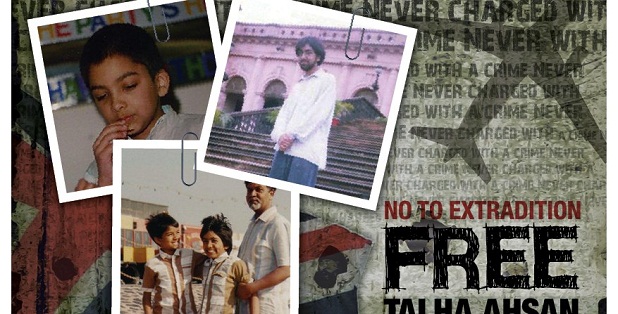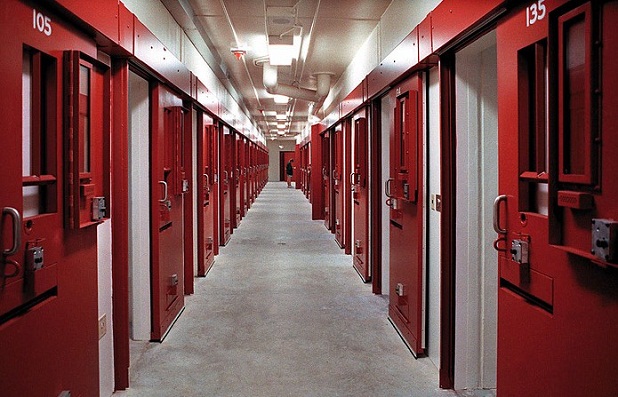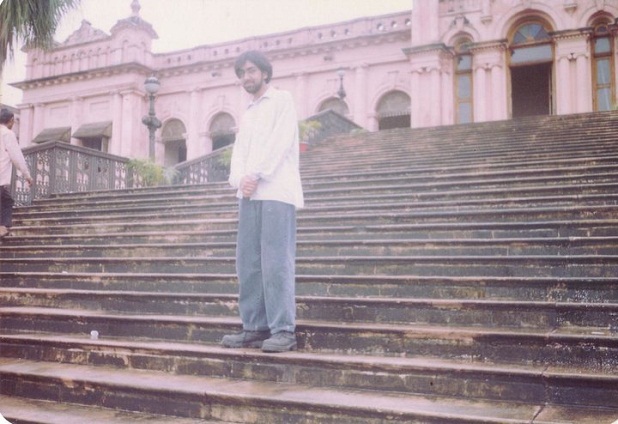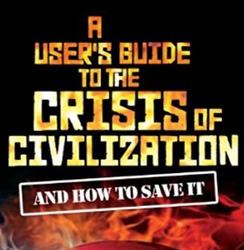Politics When Innocence is Not Enough: Talha Ahsan and the Rise of the (In)Security State
New in Ceasefire, Politics - Posted on Sunday, July 10, 2011 16:59 - 9 Comments
Three days ago was the six year anniversary of the London bombings. The anniversary passed relatively quietly – except for the appalling revelation that News of the World journalists had hacked into the phones of relatives of the 7/7 victims. Curiously, Scotland Yard seemed to have known about the hacking long ago, according to Graham Foulkes, whose son David was killed in the attacks. Further revelations that up to five Metropolitan Police officers had received bribes totalling £100,000 from the paper underscored the extent to which police corruption had facilitated the scandal
Nine days from now comes another anniversary – much less well-known, but nevertheless worthy of our attention – the five year anniversary of the detention without trial of a young British Muslim, Talha Ahsan. I first learned about Talha’s case around 2007, when I went to pick up my father and stepmother from their friend’s house in South London. It was late Friday evening, but I’d managed to find parking near the house.
When the front door opened, I was greeted by a mild-mannered elderly gentleman, Mr. Ahsan. He led me upstairs to where my dad was already seated with his wife, and I was offered tea and a delectable assortment of Indian sweets by Mrs. Ahsan. My dad introduced me as an author and mentioned my then-new book, The London Bombings: An Independent Inquiry (Duckworth, 2006), in which I had challenged the British government’s account of its policies before and after the 7/7 terrorist atrocities. The topic immediately struck the interest of our host, and I quickly learned all about what had happened to their son Talha.
Guilty With No Opportunity of Being Proven Innocent
Despite being very familiar with the history of US-UK counterterrorism operations and their often draconian and indiscriminate focus on Muslim communities, Talha’s case – and the fact that I’d never even heard about it in the mainstream press – shocked me to the bone. On 19th July 2006, Talha had been suddenly arrested by British police at his home. That very week, he had several job interviews scheduled to train as a librarian – although diagnosed with Asperger Syndrome, Talha is an extraordinarily bright young man, who had recently graduated with first class honours from the School of Oriental and African Studies. Since then he has been imprisoned without charge.
Talha’s arrest was made at the request of US authorities under the 2003 Extradition Act. Unfortunately the Act requires no presentation of even prima facie evidence that would back-up a charge. Instead, US authorities can simply issue a demand to their British counterparts, who on that basis can detain people indefinitely without charge or trial. Although never questioned by either British or US police, Talha has now been in prison for half a decade, although no effort has ever been made to prove his guilt, or to assess the US government’s alleged case against him.
Whatever the details, it’s unlikely to be a very strong case. Ahsan is one among several Muslims in Britain accused by US authorities of involvement in terrorism-related activities, without a shred of evidence being provided. In all these cases, any investigations by British police and the Crown Prosecution Service concluded unequivocally that there was insufficient evidence to charge the suspects – let alone detain them indefinitely.
7/7 and 9/11: The Politics, and the Farce, of Extradition
In one case, the extradition process appears designed to conceal the dubious and dangerous activities of security agencies. Another Briton awaiting extradition to the US is Haroon Rashid Aswat. Officially, US authorities want him to stand trial because, they say, he was involved in helping to set-up a terrorist training camp in Oregon in 1999. But the extradition request came after Aswat was arrested by British police shortly after the 7/7 attacks, which they suspected him of masterminding.
The arrest was based on extensive telephone intercepts between Aswat and the 7/7 ringleader Mohamed Sidique Khan, in the weeks prior to the attacks. When former Army intelligence officer and US Justice Department prosecutor John Loftus came on record confirming that Aswat, along with Abu Hamza and Omar Bakri Mohammed, had been on the MI6 payroll since 1996 to facilitate Islamist-activities in the Balkans, British authorities almost immediately softened their allegations that Aswat had masterminded the 7/7 attacks, and subsequently withdrew the allegations completely without explanation.
Currently, Aswat is still awaiting extradition. One wonders why the US authorities waited so long until after the British detained him in connection with 7/7, before seeking his extradition for an alleged crime six years earlier. Perhaps it had something to do with the embarrassing notion, voiced by Loftus, that Aswat had entered and left the UK despite being on a terrorist watch-list before 7th July 2005 precisely because he was still under MI6 protection.
In another case, that of Loffi Raissi, extradition appears to be nothing more than a politicized farce to prop up prevailing security narratives. An Algerian-born British resident, he was arrested shortly after 9/11, then released by British police without charge. Then suddenly he was re-arrested under a US extradition request, which alleged that he had provided flight training to four of the 9/11 hijackers. Consequently, the prosecution stated they might even seek the death penalty against him.
But the case pretty much collapsed during Raissi’s extradition hearings, in which every US allegation against him and the evidence it was supposed to be based on, turned out to be either false, or wholly fabricated. In the end, the Court of Appeal released Raissi from all charges in early 2008, and condemned the police and CPS for abusing the court process on the basis of false allegations.
The concluding statement of the three senior British judges presiding over the Raissi case was damning, and apply fully to Talha’s ongoing situation:
“It appears to us to be likely that the extradition proceedings were used for an ulterior purpose, namely to secure the appellant’s detention in custody in order to allow time for the US authorities to provide evidence of a terrorist offence… We consider that the way in which extradition proceedings were conducted in this country, with opposition to bail based on allegations which appear unfounded in evidence, amounted to an abuse of process.”
Whose Terrorism, Really?
Talha Ahsan is now in Long Lartin high-security prison awaiting extradition to the US, where authorities want to put him on trial for alleged terrorist offences – for which no evidence at all has yet been provided. US authorities accuse Talha of operating a series of websites between 1997 and 2004 – azzam.com, azzam.co.uk, qoqaz.net, and qoqaz.co.uk. These sites were allegedly used to recruit people to join Chechen and Afghan mujahideen fighters allegedly linked to al-Qaeda.
US authorities also claimed that Ahsan helped to raise money for such groups by distributing books, videotapes, audio cassettes and CDs promoting jihad. But just as the accusations against Raissi turned out to be false and politically-motivated, there is no reason to assume the allegations against Talha will be any different.
Even so, military resistance against foreign occupation is a right recognized in international law under the UN General Assembly 1960 Declaration on the Granting of Independence to Colonial Countries and Peoples. By that token, as long as it does not violate the international laws of war, Chechen and Afghan resistance to foreign occupation and material support for that resistance is legitimate.
Admittedly, the matter is complicated by the increasing role that al-Qaeda affiliated operatives have played in these war theatres. Unfortunately, it so happens that this increasing role has coincided with US involvement. Indeed, rather than randomly targeting innocent Muslims, US authorities would better invest their energies in investigating how clandestine US defence funds have systematically supported Islamist terrorist activities in these very regions.
For instance, Yousef Bodansky, then-Director of the US Congressional Task Force on Terrorism & Unconventional Warfare, reported that US government officials participated in a December 1999 formal summit in Azerbaijan, where they agreed “specific programmes for the training and equipping of mujahidin from the Caucasus, Central/South Asia and the Arab world”. Private US security companies working with long-standing regional client-states such as Turkey, Jordan and Saudi Arabia were encouraged “to assist the Chechens” to surge in the spring of 2000. Why, you might wonder incredulously? According to Bodansky, to “deprive Russia of a viable pipeline route through spiralling violence and terrorism.”
Not to mention Afghanistan, where the US government pursued “a covert policy that has empowered the Taliban”, as revealed by US Congressional hearings in late 2000, under the (evidently false) assumption that “the Taliban would bring stability to Afghanistan and permit the building of oil pipelines from Central Asia through Afghanistan to Pakistan.”
Free Talha
Unfortunately, investigating authorities continue to display little interest in exploring how covert Western government sponsorship of Islamist militants has undermined national security. Meanwhile, as dubious foreign policies continue to aggravate hostility towards the West from the Muslim world, the rise of the security state continues to catch thousands of innocent people in its indiscriminate web. Talha Ahsan, and his family, are yet another set of unfortunate victims of an increasingly unaccountable (in)security state.
But it doesn’t have to be this way. One way to challenge the (in)security state is to support the Free Talha Campaign supported by the Islamic Human Rights Commission. Enough voices can compel the authorities to take notice.
Find out how to add your voice to the growing chorus here.
Dr. Nafeez Mosaddeq Ahmed is Executive Director of the Institute for Policy Research & Development in London. His latest book is A User’s Guide to the Crisis of Civilization: And How to Save It (Pluto/Palgrave Macmillan, 2010). He is the writer and narrator of the forthcoming documentary film, The Crisis of Civilization (2011).
Photo Credits: http://freetalha.org/
9 Comments
Sheiikh Omar Bakri
Oh sorry, did I strike a raw nerve?
Feeling a biit defensive about the latest slew of US-Saudi funds you’ve been siphoning off while you spout illiterate drivel and hatred?
When Innocence is Not Enough: Talha Ahsan and the Rise of the (In)Security State | Free Talha Ahsan
[…] Photo Credits: http://freetalha.org/ SOURCE: Ceasefire Magazine […]
Mujahid Islam
You should know that Talha is also a poet.
His poems in prison, ‘This be the Answer’, were published by Radio Ramadan Edinburgh as part of their Taught by the Pen Festival in Feb 2011.
See here:
or
http://www.sacc.org.uk/index.php?option=content&task=view&id=851&catid=29
or
[…] Nafeez Mosaddeq Ahmed, Ceasefire Magazine, 10 juillet […]
Roland Barthes’s Mythologies: Naturalisation, Politics and everyday life | Ceasefire Magazine
[…] at the examples and something else might appear. Perhaps the Muslim youth is an innocent victim of repressive policies. Perhaps the child is a bullying or abuse survivor, working through frustration. Perhaps the […]
khilafah…
[…]Politics When Innocence is Not Enough: Talha Ahsan and the Rise of the (In)Security State | Ceasefire Magazine[…]…
Family Law…
[…]Politics When Innocence is Not Enough: Talha Ahsan and the Rise of the (In)Security State | Ceasefire Magazine[…]…
[…] case of Talha Ahsan, a poet and first class SOAS graduate, who suffers from Asperger’s, is worth highlighting for […]






What a foolish analysis…. how sallow you could be when you think that a Muslim who Call for Khilafah and support Jihad and Mijahideen could have any relationship with Kufaar such as MI5 or MI6 or the British police or security …. grown up title bit is better for your future .
Sheikh Omar Bakri Muhammad Fostok
Lebanon- Tripoli
0096170957759